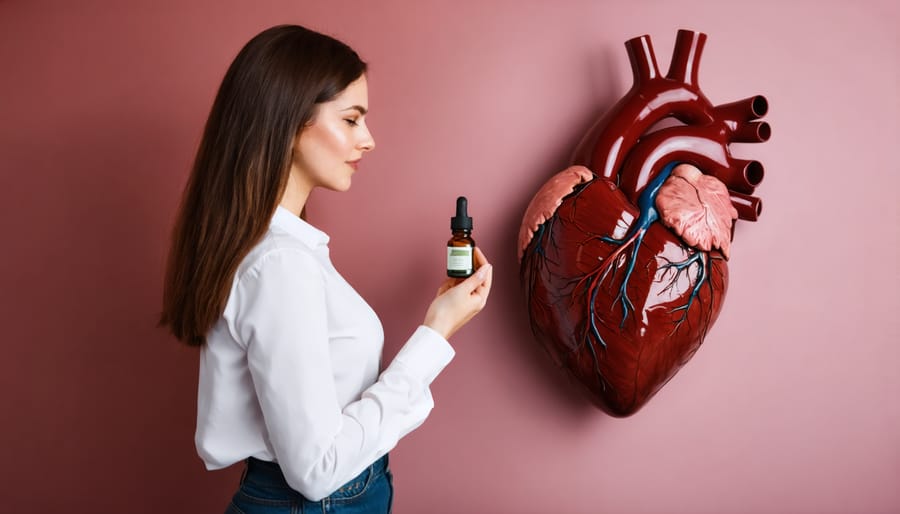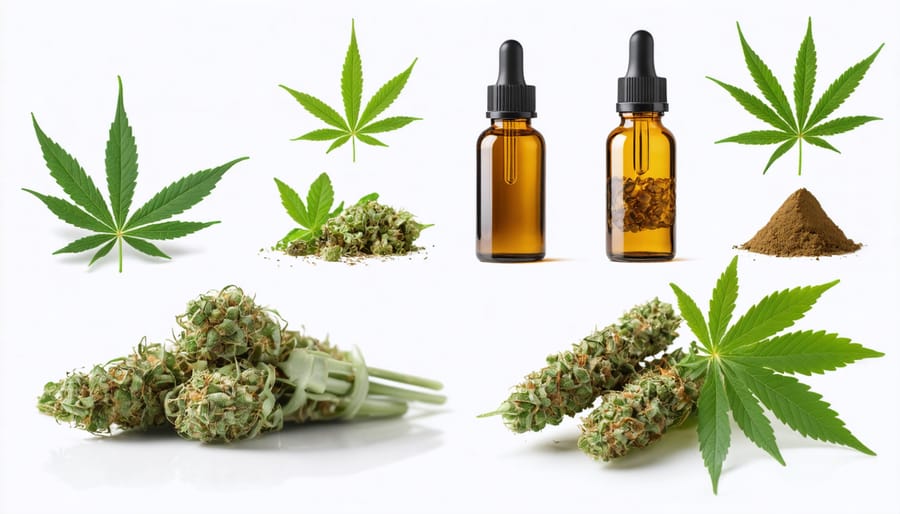Monitor your cardiovascular wellness differently as a woman, recognizing unique heart health symptoms in women. Consider incorporating premium CBD oil Canada into your heart health routine, backed by emerging research on its anti-inflammatory properties.
As someone who discovered CBD’s potential impact on heart health through my own journey with hypertension, I understand the importance of natural solutions that work alongside traditional care. Recent studies suggest CBD may help regulate blood pressure and reduce inflammation – two crucial factors in women’s cardiovascular health. While pharmaceutical options remain important, many women are turning to CBD as a complementary approach to support their heart health goals.
Our cardiovascular needs differ significantly from men’s, particularly during hormonal transitions like menopause. CBD’s interaction with our endocannabinoid system offers promising benefits for managing stress-related heart concerns, a factor that disproportionately affects women’s cardiac health. Let’s explore how this natural compound could become part of your heart-healthy lifestyle, supported by both scientific evidence and real women’s experiences.

How CBD Supports Women’s Cardiovascular Health
Anti-inflammatory Properties
When it comes to heart health, inflammation is a critical factor that many women need to be aware of. Research has shown that chronic inflammation can contribute to various heart conditions, including atherosclerosis and heart disease. This is where CBD’s natural anti-inflammatory properties come into play, offering promising benefits for women’s cardiovascular health.
Sarah Mitchell, a 52-year-old yoga instructor from Vancouver, noticed significant improvements in her inflammatory markers after incorporating CBD into her daily wellness routine. “My doctor was surprised by the positive changes in my latest check-up,” she shares. “The combination of CBD with my regular exercise routine seems to be making a real difference.”
CBD works by interacting with the body’s endocannabinoid system, helping to regulate inflammatory responses. Studies have shown that CBD can reduce several markers of inflammation that are particularly relevant to heart health. It does this by inhibiting the production of inflammatory molecules and decreasing oxidative stress, which can damage blood vessels over time.
Dr. Emily Chen, a cardiologist specializing in women’s heart health, explains, “The anti-inflammatory effects of CBD are particularly interesting because women often experience different inflammatory patterns than men, especially during hormonal changes throughout their lives.”
While more research is still needed, current evidence suggests that CBD’s anti-inflammatory properties may help protect the heart by reducing chronic inflammation, potentially lowering the risk of heart disease in women.
Blood Pressure Management
Recent studies have shown promising results regarding CBD’s potential role in blood pressure management, offering new hope for women concerned about their cardiovascular health. As high blood pressure remains a significant risk factor for conditions like atrial fibrillation in women, finding natural support methods has become increasingly important.
Sarah Thompson, a 55-year-old yoga instructor from Vancouver, shares her experience: “After incorporating CBD oil into my daily routine, alongside my doctor-approved treatment plan, I noticed my blood pressure readings became more stable during my regular checkups.”
Research suggests that CBD may help regulate blood pressure through its interaction with the endocannabinoid system and its potential anti-inflammatory properties. A notable study published in the Journal of Clinical Medicine found that a single dose of CBD reduced resting blood pressure in stress conditions.
However, it’s essential to approach CBD use thoughtfully. Dr. Emily Chen, a Canadian cardiologist, emphasizes, “While CBD shows promise, it should never replace prescribed medications without medical supervision. Women should always consult their healthcare provider, especially if they’re taking other medications.”
For optimal results, consider starting with a low dose and monitoring your blood pressure regularly. Keep a journal of your readings and any changes you notice, sharing this information with your healthcare team to ensure the best possible outcomes for your heart health journey.
Women-Specific Heart Health Considerations
Hormonal Influences
Hormonal fluctuations throughout a woman’s life can significantly impact heart health, making it crucial to understand how CBD might help manage these changes. Research suggests that estrogen plays a vital role in protecting the heart, which is why cardiovascular risks for women often increase during menopause when estrogen levels decline.
CBD may help regulate hormonal balance by interacting with the endocannabinoid system, which plays a crucial role in hormone production and regulation. Sarah Mitchell, a 52-year-old yoga instructor, shares her experience: “During perimenopause, I noticed my heart racing more frequently. Adding CBD to my daily routine helped me feel more balanced and calm.”
Studies indicate that CBD might help modulate cortisol levels, often called the stress hormone, which can affect blood pressure and heart function. This is particularly relevant during hormonal transitions like menstruation, pregnancy, and menopause, when stress levels may be elevated.
Additionally, CBD’s anti-inflammatory properties may help counter the effects of hormonal changes that can increase inflammation in the body, potentially supporting heart health during these transitional periods. However, it’s essential to consult with your healthcare provider before incorporating CBD into your hormone management strategy, especially if you’re taking hormone replacement therapy or other medications.

Stress and Anxiety Management
For many women, the daily juggle of work, family, and personal responsibilities can create a constant undercurrent of stress and anxiety. These emotional pressures don’t just affect our mental well-being; they can significantly impact heart health, with women being particularly vulnerable to stress-related cardiovascular issues.
Sarah Thompson, a 45-year-old teacher from Vancouver, discovered that incorporating CBD into her daily wellness routine helped manage her stress-induced heart palpitations. “After consulting with my healthcare provider, I started using CBD oil, and within weeks, I noticed I was feeling more centered and my heart wasn’t racing as often,” she shares.
Research suggests that CBD may help regulate the body’s stress response by interacting with receptors involved in managing anxiety and blood pressure. Dr. Emily Chen, a cardiologist specializing in women’s heart health, explains that CBD’s potential anti-anxiety properties could help break the cycle of stress-related heart issues many women face.
However, it’s essential to remember that CBD is just one tool in a comprehensive approach to heart health. Combining CBD use with other stress-management techniques like regular exercise, meditation, and proper sleep can create a more robust defense against stress-related heart concerns. As with any wellness supplement, it’s crucial to discuss CBD use with your healthcare provider, especially if you’re taking other medications or have existing heart conditions.
Safe CBD Usage for Heart Health

Choosing Quality Products
When it comes to selecting CBD products for heart health, quality and safety should be your top priorities. As a woman who has navigated the CBD market myself, I understand how overwhelming the choices can be. Here are essential guidelines to help you make informed decisions.
First, always choose products from reputable manufacturers who provide third-party lab testing results. These certificates of analysis (COAs) should be easily accessible and verify the CBD content, THC levels, and absence of contaminants like heavy metals and pesticides.
Look for products that clearly state their CBD concentration and serving sizes. Full-spectrum CBD products contain multiple beneficial compounds from the hemp plant, while CBD isolates offer pure CBD. Both can be effective, but full-spectrum products may provide additional benefits through the entourage effect.
Consider the delivery method that best suits your needs. CBD oils offer precise dosing and quick absorption, while capsules provide convenience and consistent dosing. Topical products can be beneficial for localized concerns but may not directly impact heart health.
Pay attention to organic certification and extraction methods. CO2 extraction is considered the gold standard, producing clean, high-quality CBD without harmful residues. Check product reviews and seek recommendations from trusted healthcare providers who are knowledgeable about CBD use.
Remember, the cheapest option isn’t always the best value. Invest in quality products from companies that prioritize transparency and customer education.
Important Safety Considerations
While CBD shows promise for heart health, it’s crucial to approach its use with careful consideration, especially if you’re taking heart medications. Research shows that CBD can interact with certain cardiovascular medications, particularly blood thinners and beta-blockers. As Sarah Thompson, a cardiac nurse in Toronto, shares, “I’ve seen patients experience unexpected medication interactions simply because they didn’t discuss their CBD use with their healthcare provider.”
Understanding these cannabis effects on heart health is essential for making informed decisions about your wellness routine. Always consult with your healthcare provider before incorporating CBD into your heart health regimen, especially if you’re taking:
– Blood pressure medications
– Anticoagulants or blood thinners
– Cholesterol-lowering drugs
– Heart rhythm medications
Additionally, be mindful of CBD product quality and dosage. Choose products from reputable manufacturers that provide third-party testing results. Start with a low dose and monitor your body’s response, paying attention to any changes in blood pressure or heart rate.
For women with a history of heart conditions, pregnancy, or those planning to become pregnant, extra caution is warranted. Some women report mild side effects like fatigue or changes in appetite, which could affect heart health management strategies. Keep a symptom diary and share any concerns with your healthcare team promptly.
As we’ve explored throughout this article, CBD shows promising potential for supporting women’s heart health through various mechanisms, from stress reduction to inflammation management. However, it’s important to remember that while research is encouraging, CBD is just one piece of the larger heart health puzzle.
Every woman’s journey to heart health is unique, and what works for one may not work for another. That’s why it’s crucial to approach CBD as part of a comprehensive heart health strategy that includes proper nutrition, regular exercise, stress management, and regular medical check-ups.
Before incorporating CBD into your heart health routine, schedule a conversation with your healthcare provider. They can help evaluate your individual needs, consider any medications you’re currently taking, and determine if CBD is appropriate for your situation. This is especially important if you have existing heart conditions or are taking blood pressure medications.
Remember, you’re not alone on this journey. Many women are taking proactive steps to protect their heart health, and there’s a growing community of healthcare providers who understand the importance of exploring natural alternatives alongside conventional treatments.
By staying informed, working closely with healthcare professionals, and listening to your body, you can make empowered decisions about your heart health. Your heart deserves the best care possible, and that starts with making well-informed, personalized health choices.




